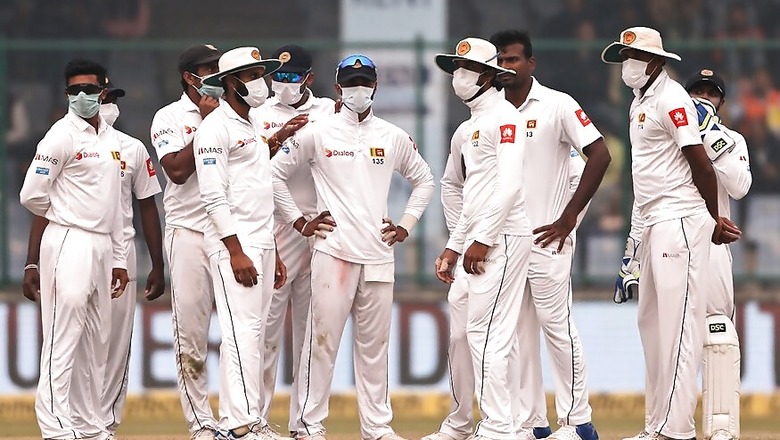
views
New Delhi: It’s a shameful day for India when cricketers from another country are forced to wear masks, struggling to cope with the pollution in the capital city. But, it’s even more shameful to ignore the situation, and instead, blame the players for “hiding behind the mask”.
While the BCCI officials and many on social media are outraged because of the Sri Lankan cricketers’ reluctance to play as they interrupted the game several times on the second day of the third Test between India and the visiting team, the real question to ask is, should we really blame them?
No. Not if you believe the doctors who have repeatedly said that the AQI (Air Quality Index) in Delhi is so hazardous that it’s like smoking 45 cigarettes a day. Not if you are aware that only last month the Indian Medical Association (IMA) wrote to the Delhi government urging schools to stop all outdoor sports and activities.
If the doctors’ advice is to be taken seriously, we shouldn’t even be stepping out of our homes for “morning and evening walks” and here we are expecting players to engage in a sport like Test cricket— where they are playing for six hours a day for five consecutive days.
At some point during the match, Ashish Nehra commented that the air quality in Sri Lanka is better than that of India. While admitting that Delhi’s air is sickening, he said that “every nation has its drawbacks”. “In Delhi, air quality is bad this month. But they shouldn't make an issue out of it and adjust,” Nehra said. Soon after, he wasn’t sure if there was pollution. “Are we are mistaking fog for smog? This can be fog as well."
Nope, Nehra. No one’s mistaken. At the time of writing this, in Delhi, the levels of the deadliest, tiny particulate matter — known as PM 2.5, which lodge deep in a person’s lungs — range between 200-300. Some of the places are worse. The level of PM 2.5 in Anand Vihar is 999, in RK Puram it’s 577. In Sri Lanka’s capital city, the PM 2.5 level is 80.
After the interruptions, Virat Kohli was forced to declare the match earlier than he would have preferred. The Indian captain was clearly not happy and neither was the acting BCCI President CK Khanna, who thought the Sri Lankans were making an “unnecessary fuss”.
The angry official said, “If 20,000 people in the stands did not have problem and the Indian team did not face any issue, I wonder why Sri Lankan team made a big fuss. I will need to talk to the secretary and ask him to write to the Sri Lanka Cricket.”
Clearly, no one told the BCCI officials about the “gas chamber” we are living in.
Meanwhile, Sri Lanka’s cricketing board have got in touch with the BCCI asking them to explain why the national capital was chosen as the venue for the match.
And while the BCCI is complaining about the interruptions during the match, here’s a reminder. Last year, the Ranji Trophy clash between Bengal and Gujarat at the Feroze Shah Kotla stadium was called off, thanks to the pollution. In Karnail Singh Stadium too, the match between Hyderabad and Tripura was called off. Thankfully, the BCCI realised it wouldn’t be fair to expect the cricketers to play being subjected to the severe air pollution.
Javier Ceppi, the FIFA U-17 World Cup tournament director tweeted, “You can't host sport events in Delhi from Diwali till end of Feb, at least.” Ceppi said that even they had to accommodate their schedule to avoid it. He asked other sporting organisation to think about the athletes’ health first.
It’s practically a no-brainer to understand that subjecting an athlete to high levels of pollution for a long period of time will affect their breathing, and hence, their performance.
The chatter on social media that the Sri Lankans were using the mask as an excuse to slow down the play and disturb the concentration of Indian batsmen is ridiculous. The only thing real in all of this was— the pollution. That has become normal for the people living here. And probably, when the BCCI said that 20,000 people did not have problems, it is because it is normal for us to breathe this air. We cannot expect that from people who usually don’t live in this kind of pollution.
The Sri Lankan cricketers’ message to us was clear— there should be no sports in Delhi till the situation improves. But is anyone listening?

















Comments
0 comment